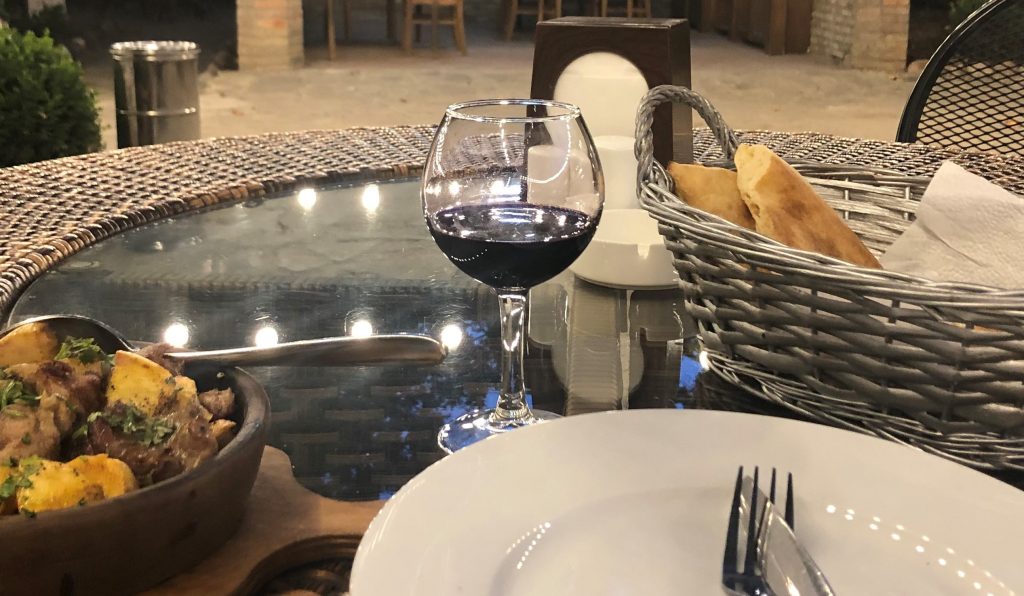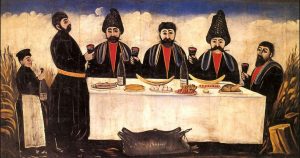The art of wining and dining is intimately connected to the language of eating and drinking, which comes with a wide array of delicious lexicon and exotic yet tantalizing etymologies. The words we devour on a daily basis can sometimes have the strangest origins and provenances, so just by opening your fridge or cupboards you are greeted by products which names have travelled far in both space and time. Since we today, on the last day of April, celebrate the Swedish feast day of Valborg’s Eve or Walpurgis Night, it becomes natural to focus on the liquid substances as I would like to offer you a glass of wine-related wisdom.

Most of you might wonder which language the elfish word in the title comes from and some of you have hopefully guessed that it means ‘wine’. The language is the South Caucasian or Kartvelian language Georgian and it reads ‘ɣvino‘. The oldest evidence of wine-making in the Near East has been found in Georgia from around 6000 BCE (McGovern et al. 2017), and the exact origin of the word ‘wine’ is unclear. It is clear however that the English word ‘wine’ and its equivalents in most languages across Europe are either descended or borrowed from Latin vīnum. This is not surprising as the Romans were keen winers and their word for wine thus spread with viticulture and trade. The question is therefore what is the origin of vīnum?

The conventional explanation is that it ultimately comes from the Proto-Indo-European root *ueh₁-i- ‘to turn, bend’ (Beekes 2010), but Beekes also points out that since viticulture emerged in the southern Caucasus it might originally be a loanword from this region and thus is possibly of non-Indo-European origin. This is interesting as the Georgian word ɣvino is considered by many Kartvelologist such as Fähnrich to be a native Georgian word, as it can be reconstructed in Proto-Kartvelian and is connected to the Proto-Kartvelian root *ɣun- ‘to bend, wind’ (Fähnrich 2007). Beekes claims however that the Georgian word is borrowed from Armenian gini (Beekes 2010), as ɣvino is traditionally considered to be borrowed from Indo-European.

We will never know with certainty which of these etymologies is correct, but some etymologies are clearly more likely than others. There is also a tendency for etymologies of food terms to recapitulate the provenance of the concept it refers to, which means that the origin and historical spread of a food item often is reflected in its etymology. A typical example of this is the word ‘pilsner’, which refers to a type of beer originally from Plzeň in Bohemia in the Czech Republic. The German name of the city is Pilsen and Pilsner is an adjective meaning ‘from Plzeň’. English borrowed the word from German as the prestige language of Bohemia was German at the time it entered English. If the concept ‘pilsner’ would be borrowed today, it might have been called the Czech counterpart plzeňské instead!

Wine could therefore potentially be another example of this tendency, carrying the word *ɣvin- from its origins in prehistoric Georgia via the wine-loving cultures of the Mediterranean to the rest of Europe. I must however point out that since the time-depth is several thousand years it is impossible to know for sure, and the question has been discussed in lengths without any conclusive arguments. I will therefore conclude by asking once more: In ღვინო veritas?
If you want to know more about culture vocabulary and etymologies like the example above please visit the website of our project DiACL: Diachronic Atlas of Comparative Linguistics.
References
Beekes, Robert S. P. (ed.) (2010). Etymological Dictionary of Greek. Indo-European Etymological Dictionaries Online. Brill Online. Leiden: Brill.
Fähnrich, Heinz (2007). Kartwelisches etymologisches Wörterbuch. Leiden: Brill.
McGovern, P., Jalabadze, M., Batiuk, S., Callahan, M. P., Smith, K. E., Hall, G. R., Kvavadze, E., Maghradze, D., Rusishvili, N., Bouby, L., Failla, O., Cola, G., Mariani, L., Boaretto, E., Bacilieri, R., This, P., Wales, N., & Lordkipanidze, D. (2017). Early Neolithic wine of Georgia in the South Caucasus. Proceedings of the National Academy of Sciences of the United States of America, 114(48), E10309–E10318.
